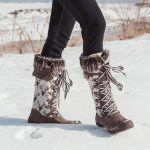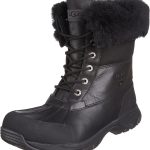Wear Hunter Boots In The Snow With Confidence: Discover The Ultimate Snow-Proof Footwear!
Can I Wear Hunter Boots in the Snow?
Introduction
Good day, Boots Enthusiast! Today, we will discuss a burning question that many people ponder during the winter season: Can I wear Hunter boots in the snow? As the temperature drops and snowflakes start to fall, it’s important to choose the right footwear to keep your feet warm, dry, and safe. In this article, we will delve into the world of Hunter boots and explore whether they are suitable for snowy conditions. So, grab a cup of hot cocoa and let’s dive in!
Table: Can I Wear Hunter Boots in the Snow
Information
Details
Brand
Hunter
2 Picture Gallery: Wear Hunter Boots In The Snow With Confidence: Discover The Ultimate Snow-Proof Footwear!
Type of Boots
Wellington Boots

Image Source: justatinabit.com
Material
Natural Rubber
Insulation
No Insulation
Traction
Good Traction
Waterproof
Yes
What are Hunter boots?

Image Source: justatinabit.com
Hunter boots, also known as Wellington boots, are a popular choice for rainy days and outdoor activities. They are made from natural rubber, which makes them highly waterproof and durable. Initially designed for hunting and agricultural purposes, Hunter boots have become a fashion statement in recent years. With their iconic design and wide range of colors, they have gained a loyal following.
Who can wear Hunter boots in the snow?
Anyone can wear Hunter boots in the snow, as long as they take certain factors into consideration. These boots are suitable for individuals who live in regions with mild to moderate snowfall. However, if you reside in an area with heavy snow or extreme winter conditions, it is advisable to opt for boots with more insulation and traction.
When should you wear Hunter boots in the snow?
Hunter boots are designed to be worn in wet conditions, including snow. They are ideal for activities such as walking, hiking, and running errands during light snowfall. However, it is important to note that Hunter boots are not suitable for deep snow or harsh winter conditions. Always assess the weather and terrain before deciding to wear them.
Where can you wear Hunter boots in the snow?
You can wear Hunter boots in various snowy environments, such as city streets, parks, and light hiking trails. These boots provide excellent waterproof protection, keeping your feet dry and comfortable. Whether you’re strolling through a winter wonderland or shoveling snow, Hunter boots can be a stylish and practical choice.
Why should you wear Hunter boots in the snow?
There are several reasons why wearing Hunter boots in the snow can be beneficial. Firstly, their waterproof feature ensures that your feet remain dry, preventing discomfort and potential health issues. Secondly, the good traction on the soles of the boots helps prevent slips and falls on slippery surfaces. Lastly, the durability of Hunter boots ensures that they can withstand the wear and tear of snowy conditions.
How to wear Hunter boots in the snow?
When wearing Hunter boots in the snow, it is recommended to pair them with warm socks to provide additional insulation. Layering your clothing appropriately will help keep your body warm overall. Additionally, make sure to walk with caution on icy surfaces and avoid deep snow, as these boots are not designed for extreme winter conditions.
Advantages and Disadvantages of Wearing Hunter Boots in the Snow
Advantages:
Waterproof: Hunter boots offer excellent waterproof protection, keeping your feet dry in the snow.
Good Traction: The soles of Hunter boots provide good traction, reducing the risk of slips and falls.
Durable: Hunter boots are made from natural rubber, making them durable and long-lasting.
Stylish: With a wide range of colors and designs, Hunter boots can add a fashionable touch to your winter outfits.
Versatile: These boots can be worn in various snowy environments, from city streets to light hiking trails.
Disadvantages:
No Insulation: Hunter boots do not have built-in insulation, so they may not provide sufficient warmth in extremely cold temperatures.
Not Suitable for Deep Snow: These boots are not designed for deep snow or harsh winter conditions, as they lack the necessary insulation and traction.
Frequently Asked Questions (FAQs)
Q: Can I wear Hunter boots in freezing temperatures?
A: While Hunter boots are suitable for mild to moderate snowfall, they may not provide enough insulation in freezing temperatures. It is advisable to opt for boots with added insulation for extreme cold conditions.
Q: Can I wear Hunter boots for winter sports?
A: Hunter boots are not suitable for winter sports such as skiing or snowboarding. They lack the necessary ankle support and insulation required for these activities.
Q: How do I clean my Hunter boots after wearing them in the snow?
A: To clean your Hunter boots, simply wipe off any dirt or mud with a damp cloth. Avoid using harsh chemicals or abrasive materials, as they may damage the rubber.
Q: Can I wear Hunter boots in slushy conditions?
A: Yes, Hunter boots are designed to withstand slushy conditions. However, it is important to rinse off any salt or chemicals that may have come in contact with the boots to prevent damage.
Q: Are Hunter boots suitable for all foot sizes?
A: Hunter boots come in a range of sizes and are designed to accommodate different foot sizes. It is recommended to refer to the size guide provided by the manufacturer before making a purchase.
Conclusion
In conclusion, wearing Hunter boots in the snow is a viable option for individuals living in regions with mild to moderate snowfall. They provide excellent waterproof protection and good traction, making them suitable for various snowy environments. However, it is essential to consider the lack of insulation and their limitations in deep snow and freezing temperatures. Remember to always assess the weather and terrain before deciding to wear Hunter boots in the snow.
So, fellow Good People, whether you’re planning a snowy adventure or simply braving the winter weather, make an informed choice when it comes to your footwear. Stay warm, stay dry, and stay stylish!
Final Remarks
It is important to note that the information provided in this article is based on general knowledge and experiences. Individual preferences, weather conditions, and other factors may influence the suitability of wearing Hunter boots in the snow. Always prioritize your safety and comfort when choosing footwear for winter activities. Stay informed, stay protected, and enjoy the beauty of the winter season!
This post topic: Boots


